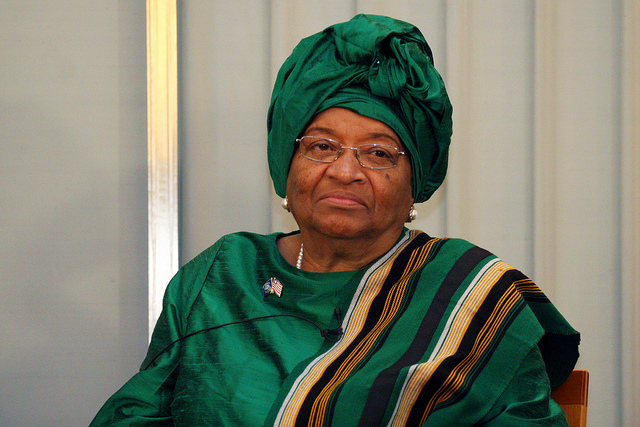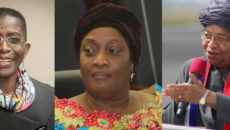Since Donald Trump’s victory over Democratic nominee Hillary Clinton on November 8, 2016, world leaders began to immediately react in diverse manners to Trump’s landmark victory. Surely, Trump’s victory took the entire world by surprise, especially when most opinion polls suggested that Clinton was the likely winner prior to the election.
While dozens of heads of states were congratulating Trump, the president of Liberia, Ellen Johnson Sirleaf, told BBC during an interview:
We are extremely saddened by this missed opportunity on the part of the people of the United States to join smaller democracies in ending the marginalization of women.
We are concerned as to whether President-elect Trump will have an African agenda, will be able to build bridges with Africa. We can only hope that he will do so in due course. I’m worried about trade deals for Liberia, for Africa. I’m worried about investment and the special programs that have been put in place by President Obama and by President George Bush before him, and we just don’t know what the policy towards Africa will be.
I wonder why Sirleaf could not even congratulate Trump before reacting in such a manner; after all, even Hilary Clinton congratulated him and offered to work with him on behalf of America. Sirleaf’s initial reaction was diplomatically erroneous and democratically unjustifiable.
Even though some supporters of the president have defended her by proffering feeble analyses, I want to diametrically differ with Sirleaf for making such statement.
The president’s statement extremely opposes Trump’s victory and expressed serious disappointment in the people of the United States for electing him. I am still finding it difficult to understand her point in relationship to the marginalization of women.
Were women prevented from participating as candidates in the electoral process? Were they deprived of voting for a candidate of their choice? No woman was ever deprived of contesting or electing a candidate of her choice.
The process was free, fair, and transparent, and voters (both men and women) expressed their choice through the ballots. How are women being marginalized?
This is far from marginalization, as claimed by Sirleaf. In fact, 54 percent of women voted for Clinton while 42 percent voted for Trump, with 94 percent of black women and 68 percent of Latina women voting for Clinton.
So, where is the marginalization here when everyone had an opportunity to make their choice?
Women make up about 19 percent of the U.S. Congress. In the 115th Congress, which is expected to convene January 3, there will be 21 women in the Senate and 83 women in the House. In the previous congressional session, there were 20 women in the Senate and 84 in the House, according to the Center for American Women and Politics at Rutgers University. So, where is the marginalization? Liberia has 11 female legislators, which accounts for just 10 percent of the total number of lawmakers. A ranking of women in national parliaments worldwide shows that the United States of America ranks 99th while Liberia ranks 148th.
In the 2012 race for the Senate pro tempore, Sirleaf supported a male senator, Gbehzongar Milton Findley of Grand Bassa County, against two female senators, Jewel Howard of Bong Taylor and Clarice Jah of Margibi. Why didn’t the president support either of the female candidates? Isn’t this the real meaning of women marginalization? The president does something different in Liberia but reacts to a situation differently abroad.
The second segment of Sirleaf’s reaction hangs a cloud of uncertainty over America’s relationship with Africa. It presupposes that this relationship will deteriorate under Trump, even though there is no empirical proof to validate such assertion.
Sirleaf’s pre-judgment of Trump’s administration towards Africa was unfair and hasty. The president ignored the fact that America’s foreign policy is not influenced or shifted by the presidency alone. The U.S. Congress plays a pivotal role as well.
Even though I respect Sirleaf’s opinion, her statement is likely to hinder Africa and Liberia’s relationship with the U.S. under a Trump presidency. This could put the succeeding regime at odds with America and hurt our nation even further.
The president’s statement was predominantly driven by her longstanding and personal relationship with Clinton but the outcome of democracy must never be questioned based on friendship. I see no objectivity in Sirleaf’s statement. What I see is an expression meant to temporarily woo and console Clinton at the expense of Trump and American voters.
The president was not fair in her judgment to unjustifiably contest the will of the American people through such a demeaning characterization of Trump’s victory. In the eyes of the country, electing Trump was not a mistake. Electing Trump was the path the American people chose and this is what democracy calls for.
Instead of our president being “extremely saddened†by the missed opportunity on the part of the people of the United States, she needs to be “extremely saddened†by the fact that after 11 years of democratic rule under her presidency:
- Liberia has had 554 rape cases in one year (Ministry of Gender Report, 2014)
- The rate of teenage pregnancy is 38 percent (UNFPA, 2013)
- Monrovia ranked the least on the City Prosperity Index (UN Habitat Report 2012/2013)
- The number of dropouts in Liberian schools is high, with 65 percent accounting for boys and 73 percent for girls (National Education Profile 2014 Update)
- The maternal mortality rate stands at 1,072 deaths per 100,000 live births (Ministry of Health 2014 Report)
- Out of US$8 billion worth of natural resource contracts signed by Sirleaf since 2009, almost all (66 out of 68) violated Liberia’s Laws (Moore Stephens Report, May 2013)
- US$13.5 million in EU funding meant to reduce infant and maternal mortality rates is yet to be accounted for (FrontPage Africa Report, 2013)
- Liberia was the most corrupt country in the world (Transparency International Report, 2013)
After 11 years, the government of Liberia has received so much but has done so little. Even safe drinking water and quality education are yet to be seen. Aren’t these the facts that our president needs to be “extremely saddened†by?
Madam President, I beg to differ. In this manner, I would like to congratulate President-elect Donald Trump for his victory as Commander-in-Chief of the World Superpower.



